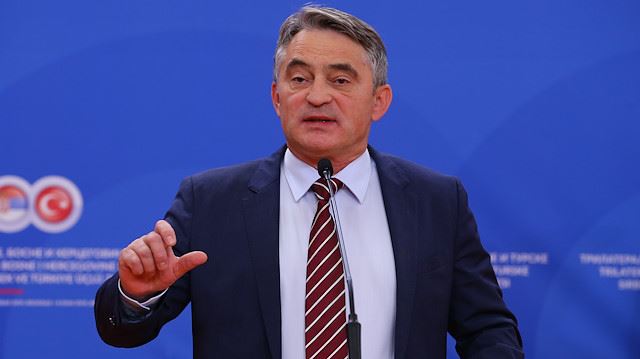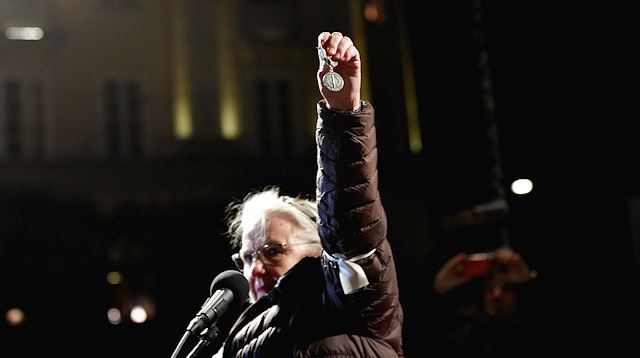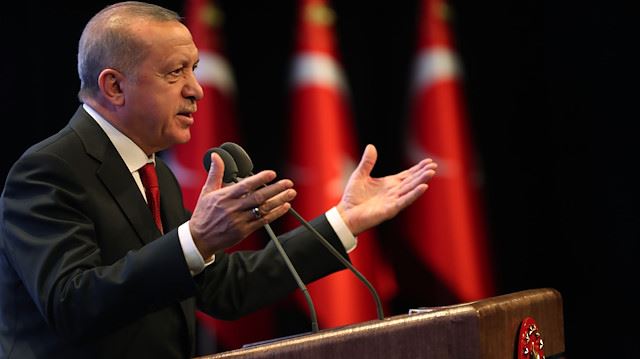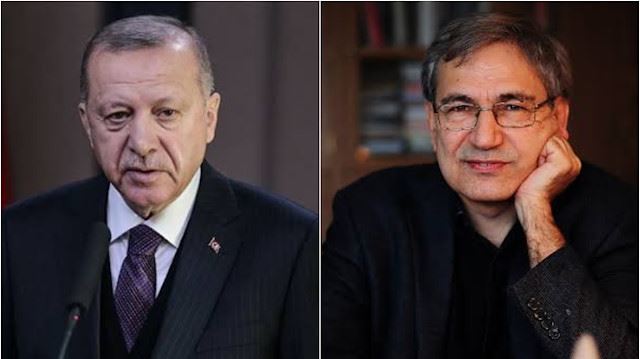The Nobel Prize ceremony was held Tuesday under the shadow of criticism amid a decision to award this year's literature prize to Peter Handke, an Aust
The Nobel Prize ceremony was held Tuesday under the shadow of criticism amid a decision to award this year’s literature prize to Peter Handke, an Austrian author who denies the Bosnian genocide.
Handke, 77, was awarded the Nobel Prize in Literature despite his open support to Serbian leader Slobodan Milosevic, who died in 2006 at the international tribunal in The Hague on trial for war crimes and genocide.
He claimed that the Muslim Bosniaks in Sarajevo had killed themselves, adding that he never believed that the Serbs had committed genocide in Srebrenica.
At the ceremony on Tuesday, Swedish King Carl Gustaf presented the awards in the capital Stockholm.
The ceremony was followed by a banquet at the nearby Stockholm City Hall where the laureates dined with members of the Swedish royal family.
Erdoğan’s remarks on Nobel Prize not for Orhan Pamuk
President Recep Tayyip Erdoğan was not referring to Turkish novelist Orhan Pamuk, who was awarded the Nobel Prize for Literature in 2006, with his “terrorist” remark, a top official said Tuesday.“Our president in no way refers to Orhan Pamuk in a speech in which he said ‘They had awarded a terrorist from Turkey’,” said Fahrettin Altun, Turkey’s communications director.Altun’s remarks came after Erdoğan’s speech at an event in the capital Ankara in reaction to awarding of the 2019 Nobel Prize in Literature to Peter Handke, an Austrian writer who is accused of denying the 1995 Bosnian genocide.Serbian president congratulates Handke over Nobel PrizeAltun said Erdoğan was referring to some names awarded or nominated for the Nobel Prize despite their anti-Turkey ideologies and terrorist inclinations.“Our president actually criticized European institutions’ awarding systems based on ideological approaches and stressed the hypocrisy in rewarding racism and terrorism,” Altun said.Turkish National Defense Ministry in a tweet said, “All ethical and humanitarian values, with peace being first and foremost, have been trampled under foot after the awarding of the Nobel Literature Prize to Peter Handke despite disapproval and objection from everyone with a conscience.”Handke is a supporter of Slobodan Milosevic who perpetrated the genocide against “our innocent Bosnian brothers,” the ministry said.Ruling Justice and Development (AK) Party spokesman Omer Celik also followed suit and said the award was given on International Human Rights Day to a person who received the Order of the Serbian Knight from Milosevic.Bosnian Croat president says Srebrenica genocide was awardedCelik described the move as “a scandal” and “a big misfortune in terms of humanity and literature”.Handke is known to be a great admirer of former Serbian leader Milosevic, who died in 2006 while facing trial in The Hague for war crimes and genocide.”Stand up if you support the Serbs,” Handke wrote during the 1998-1999 Kosovo War.He claimed that the Muslim Bosniaks in Sarajevo had killed themselves, adding that he never believed that the Serbs had committed genocide in Srebrenica.Handke also visited Milosevic in prison and tried to testify in his favor.”I am here for Yugoslavia, for Serbia, for Slobodan Milosevic,” Handke said in a 2006 eulogy for Milosevic.In winning the prize, Handke will also receive 9 million Swedish kronor ($952,000) as well as a medal and a diploma.

Bosnian Croat president says Srebrenica genocide was awarded
Today Srebrenica genocide was awarded, said Bosnian Croat President Zeljko Komsic on Tuesday referring to the decision to award this year’s Nobel Prize for Literature to Peter Handke, an Austrian author who denies the genocide.Komsic stressed that the genocide was rewarded in Sweden today.”Hate speech can be expected from someone who denies the genocide, but hatred from the award-giving side is extremely destructive,” said Komsic.He added that they will continue to fight for justice.”It is an act of hatred against the relatives of the victims,” said Komsic.Handke, 77, openly supports Serbian leader Slobodan Milosevic, who died in 2006 at the international tribunal in The Hague on trial for war crimes and genocide.He claimed that the Muslim Bosniaks in Sarajevo had killed themselves, adding that he never believed that the Serbs had committed genocide in Srebrenica.Several countries including Turkey boycotted the award ceremony.Turkish, Albanian, Kosovar and Croatian envoys to Sweden did not attend the ceremony.
James Peebles, Michel Mayor and Didier Queloz were presented with the physics award.
In chemistry, the award was shared by John B. Goodenough, M. Stanley Whittingham and Akira Yoshino.
William Kaelin Jr., Peter J. Ratcliffe and Gregg L. Semenza won the award for medicine.
Abhijit Banerjee, Esther Duflo and Michael Kremer won the prize in economics.
The 2018 literature award, which was also presented this year, went to Olga Tokarczuk.
Several countries including Turkey boycotted the award ceremony.
Turkish, Albanian, Kosovan and Croatian envoys to Sweden did not attend the ceremony.
Many people took to the streets to protest.
Last week, Gun-Britt Sundstrom, now a former Nobel Literature Prize committee member, announced her resignation over the controversial decision to award Handke.
Sundstrom said in a statement published in Swedish daily Dagens Nyheter that the committee defended their choice of Handke saying literature stood above politics and that she did not share that “ideology”.
International journalists and academics who gathered in Stockholm called on the Nobel Prize committee to change their minds about awarding Handke.

Swedish journo returns Nobel prize, protesting Handke
Swedish journalist Christina Doctare returned her 1988 Nobel Peace Prize to the Royal Swedish Academy on Tuesday in protest against the awarding of the 2019 literature prize to Austrian writer Peter Handke.Handke is accused of denying the 1995 Bosnian genocide by Doctare, who received the prize as a member of the UN peacekeeping forces.The 77-year-old Handke was awarded the Nobel Prize in Literature despite his open support of Serbian leader Slobodan Milosevic, who died of a heart attack in his prison cell in 2006 while being tried for war crimes and genocide at the International Criminal Tribunal for the former Yugoslavia in The Hague.Handke also claimed that Muslim Bosniaks in Sarajevo had killed themselves and said he never believed that the Serbs had committed genocide in Srebrenica.Doctare also spoke during protests in the capital Stockholm against Handke’s award.”I was proud of the Swedish Academy, but all I feel now is shame and guilt,” she said.Doctare said she had witnessed the Bosnian massacre 27 years ago and was returning her prize due the Nobel Committee’s decision to award Handke.

‘Awarding Nobel prize to Handke encourages Islam’s enemies’
Awarding the Nobel Prize to Peter Handke will only encourage “enemies of Islam and humanity”, the Turkish president said on Tuesday.Recep Tayyip Erdogan’s remarks came at a commemoration event at the presidential complex in the capital Ankara to mark the 75th year of Ahiska Turks’ exile.”It is a shame and disgrace to award a person who defends and praises a murderer who shed the blood of tens of thousands of Muslims,” Erdogan said, referring to the 2019 Nobel Laureate in Literature Peter Handke, an Austrian writer who is accused of denying the 1995 Bosnian genocide.Handke is known to be a great admirer of former Serbian leader Slobodan Milosevic, who died in 2006 while facing trial in The Hague for war crimes and genocide.”Stand up if you support the Serbs,” Handke wrote during the 1998-1999 Kosovo War.He claimed that the Muslim Bosniaks in Sarajevo had killed themselves, adding that he never believed that the Serbs had committed genocide in Srebrenica.Handke also visited Milosevic in prison and tried to testify in his favour.”I am here for Yugoslavia, for Serbia, for Slobodan Milosevic,” Handke said in a 2006 eulogy for Milosevic.In winning the prize, Handke will also receive 9 million Swedish kronor ($952,000) as well as a medal and a diploma.Turkish president called on people of conscience to react over the controversial award.“Those lecturing Turkey about democracy and law rolled out the red carpet for dictators and terrorists who killed tens of thousands of people,” said Erdogan. -550,000 Ahiska Turks away from homesRecalling that almost 550,000 Ahiska Turks have been living away from their homes, Erdogan said that upcoming projects would enable the Ahiska music, folklore, culture and art to reach more people.He said the Ahiska Turks’ heirloom architectural works should not be allowed to fade away.”We must struggle to protect our common historical heritage and to transfer it to the future generations through restoration works,” Erdogan said, adding that every disowned piece that is lost and destroyed also takes a piece of the memory.Turkish president said that the Soviet administration sent Ahiska Turks — without distinction between women, the elderly or children — to labor camps.”In these camps, thousands of our Ahiska brothers and sisters were the victims of the cold [weather] and inhuman treatment.”Also speaking at the event, Ziyatdin Kassanov, head of World Union of Ahiska Turks, recalled that about 100,000 Ahiska Turks were exiled to areas in Central Asia, nearly 40,000 others were recruited by the Soviet military services.Kassanov said almost half of the 17,000 Ahiska Turks who were sent to war areas could never manage to come back.“They massacred us but thank God we still haven’t forgotten our language, religion and traditions,” he added.On Nov. 14, 1944, more than 92,000 Ahiska Turks — including children, women and elders — were deported from their ancestral lands in the Ahiska region of Georgia to remote areas of the then Soviet Union.Scattered across nine countries with a total population of around 500,000, the Ahiska Turks are now hopeful for the future thanks to Turkey’s efforts that bore fruit.
– Peace Prize
Ethiopia’s Prime Minister Abiy Ahmed received the Nobel Peace Prize at a ceremony held at the Oslo City Hall in Norway’s capital.
Abiy received the Nobel Peace Prize for his efforts to achieve peace and international cooperation, and in particular for his decisive initiative to resolve the border conflict with neighboring Eritrea, according to the Nobel Committee.
King Harald V of Norway, Queen Sonja, Crown Prince Haakon, and Crown Princess Mette-Marit were also present at the ceremony.
